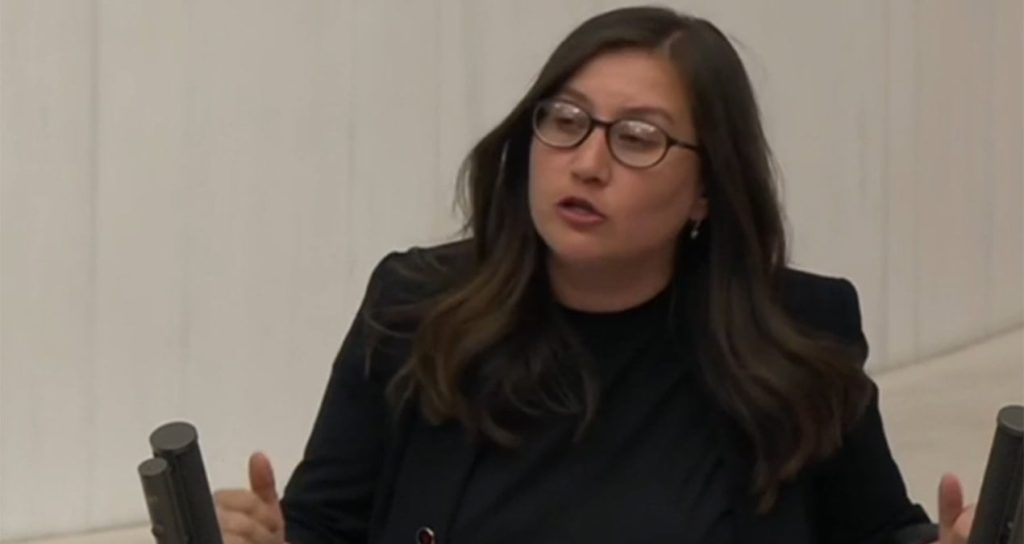A political controversy erupted during discussions on the Climate Law in the Assembly as Deputy Burcugül Çubuk made inflammatory remarks related to Kurdish massacres. Following her speech, several deputies responded vehemently to her statements, emphasizing the need for respectful discourse. The incident has drawn attention to ongoing tensions within the Assembly regarding environmental and societal issues.
| Article Subheadings |
|---|
| 1) The Climate Law Proposal: Background and Context |
| 2) Controversial Statements by Burcugül Çubuk |
| 3) Reactions from Other Parliament Members |
| 4) Call for Decorum in Parliamentary Discussions |
| 5) Aftermath: Statements and Retractions |
The Climate Law Proposal: Background and Context
The Climate Law proposal, which is currently under discussion in the General Assembly, aims to address urgent environmental issues within the region. Introduced in April, the proposal seeks to implement measures for sustainable development and mitigate climate change impacts. The significance of this legislation has drawn both support and opposition among various stakeholders, highlighting a division in perspectives on environmental conservation and socio-political responsibilities.
The law’s introduction comes amidst rising public concern over climate change and ecological degradation. Environmental groups and activists have rallied behind the proposal, advocating for stronger legislative actions to protect natural resources. However, opposition parties argue that the proposed measures might lack enforceability and fail to address underlying social injustices.
Controversial Statements by Burcugül Çubuk
During the discussions on the Climate Law, Deputy Burcugül Çubuk made a controversial statement that referred to the Kurdish massacres. After delivering her speech, she remarked, “God bless your trouble,” a comment that sparked immediate backlash from fellow parliament members. Her choice of words was perceived as disrespectful and inflammatory, especially in a legislative context demanding focus on pressing environmental issues.
The gravity of Çubuk’s comments drew criticism from across the political spectrum, with many arguing that such statements should not have a place within the Assembly. The phrase, suggesting insensitivity towards a tragic historical event, raised questions about the appropriateness of language used in political discussions.
Reactions from Other Parliament Members
The immediate response to Çubuk’s remarks was swift and critical. Pervin Buldan, the Deputy Chairman, quickly attempted to translate her comments to ensure clarity, emphasizing the need for a respectful dialogue. Leyla Şahin Usta, Vice President of the AKP Group, condemned her comments, asserting that such language is unworthy of parliamentary discourse. “We will endeavor to talk to anyone without insulting, but we cannot accept this,” Usta stated, emphasizing the need for decorum.
Moreover, Turhan Çömez, Vice President of the GOOD Party Group, also voiced his concerns, highlighting that discussions regarding nature and environmental issues require a serious tone. Members of the Dem Party echoed these sentiments, stressing the importance of maintaining a dignified environment during parliamentary sessions.
Call for Decorum in Parliamentary Discussions
The incident sparked wider discussions about the standards of communication within the Assembly. Many members pointed out that respectful dialogue is crucial, particularly when discussing significant issues affecting both the environment and society. Gülistan Kılıç Koçyiğit, another prominent voice in the opposition, emphasized that language should reflect the seriousness of topics being debated.
The call for decorum also raises broader questions regarding the responsibilities of elected representatives to lead by example. Ensuring that discussions remain constructive can influence public perception of parliamentary processes and foster a culture of accountability among lawmakers.
Aftermath: Statements and Retractions
Following the uproar over her statements, Deputy Burcugül Çubuk returned to the podium to clarify her comments. She indicated that her words were intended to address the severity of environmental destruction rather than to provoke division. The apology was perceived as an attempt to de-escalate tensions and redirect focus back on the Climate Law proposal.
Now, as the Assembly continues to deliberate on the Climate Law, the incident serves as a reminder of the delicate balance required in political discourse. The reactions from various deputies illustrate the ongoing struggles within parliamentary debates, where issues of social justice, environmental responsibility, and respectful communication intersect.
| No. | Key Points |
|---|---|
| 1 | The Climate Law proposal aims to address pressing environmental issues. |
| 2 | Çubuk’s comments regarding Kurdish massacres triggered controversy. |
| 3 | Several parliament members responded critically to her remarks. |
| 4 | Calls for decorum in parliamentary discussions have emerged from the incident. |
| 5 | Çubuk later apologized, aiming to refocus on the intent of the Climate Law. |
Summary
The recent events surrounding the Climate Law proposal highlight significant divides within the Assembly, particularly regarding environmental and social issues. The inflammatory remarks made by Deputy Burcugül Çubuk not only sparked outrage but also underscored the necessity for respectful dialogue in political discussions. As the Assembly navigates this complex landscape, the call for decorum and constructive communication remains paramount for effective governance.
Frequently Asked Questions
Question: What is the Climate Law proposal about?
The Climate Law proposal aims to implement measures for sustainable development and address pressing environmental issues within the region.
Question: Why did Burcugül Çubuk’s statements cause controversy?
Her remarks regarding Kurdish massacres were perceived as inflammatory and disrespectful, triggering backlash from fellow parliament members.
Question: What was the reaction from other parliament members?
Many members condemned her comments, emphasizing the importance of maintaining a respectful and constructive dialogue during parliamentary discussions.


